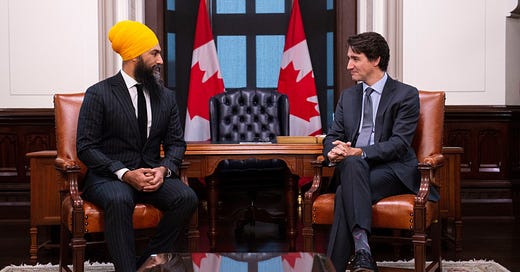Canadians are big losers in Liberal-NDP coalition
Everyday Canadians will suffer the indignity of political decisions that directly impact their lives at the ground level: higher taxes, fewer choices, fewer opportunities

Tuesday’s announcement of yet another coalition between the Liberal and New Democratic parties in Canada’s parliament is arguably a win for all political parties in the House of Commons. The big losers of the day are everyday Canadians.
Liberal Prime Minister Justin Trudeau wins in the deal. He’s able to tell his party followers, with some amount of confidence, that he has secured for them a full four-year term to acquit their agenda. The deal, which falls short of a proper coalition government, confirms a parliamentary partnership between himself and NDP leader Jagmeet Singh that has been de facto since 2019.
Publicly acknowledging and extending that agreement, however, gives Trudeau a three-year grace period in which to complete a post-pandemic victory lap before stepping down as Prime Minister, while still allowing his party ample time to find and “season” his replacement before going back to the polls.
Singh wins in the deal. It boosts his ego and allows him to tell his followers they’re still relevant in federal politics. Although, they’re increasingly not. If anything, this coalition proves the Liberals are no longer a centrist party – they’ve swallowed up all the ideological territory previously claimed by the NDP. This agreement conceivably could set the groundwork for a merger of the two parties to create a Canadian Liberal-Democratic party. This would recognize the Liberals’ ideological shift further toward progressive ideals and offer frustrated NDP members a bonafide seat at the grown-up table.
Even the Conservative Party wins in this deal. Conservatives now are all but guaranteed time to allow their new leader to settle in and reshape party structure, policies and brand image, to reintroduce themselves to a sceptical public, and to be better prepared to contest an election in 2025.
Everyday Canadians are the big losers
The only real losers in this arrangement are everyday Canadians who live in a world where government decisions directly impact their lives, either making them a little bit easier or a whole lot harder.
Without fear of an impending election, Liberal and New Democrat policymakers will be free to pursue their lofty ideological goals. This will please a minority of Canadians who support progressive dogma and who have been economically and socially successful in status quo Canada. But, most Canadians are not part of this group.
Successful Canadians who support conservative ideals will be insulted, but largely unharmed, by the government’s unopposed pursuit of progressivism.
But everyday Canadians are not ideologues. For them, politics isn’t a theoretical construct. They don’t spend time arguing the merits of competing philosophies. They will suffer the indignity of political decisions that directly impact their lives at the ground level: higher taxes, fewer choices, fewer opportunities.
For sure, some everyday Canadians may also benefit from practical social programs that make prescription medicine, housing and dental care more accessible. However, with an uncontested political field in front of them, progressive idealogues are unlikely to produce practical solutions. Nor are they much motivated to do so. For ideologues like Justin Trudeau and Jagmeet Singh, the joy is in the philosophizing – not the execution.
The only saving grace in this deal is that it may well not survive its full term. The Liberals will be motivated to delay delivery of any of the treats they’ve promised Singh, because once they’re delivered they lose leverage to guarantee NDP support. Conversely, Singh will want to force early delivery on promised ideals to secure his own support with a party that was not, even within his own caucus, fully supportive of this connivance.
So, there is yet much opportunity for roadblocks and disagreements to arise and scuttle this deal whenever the NDP believe their chances in an early election are good. The success of Canada’s working class may well depend on it.




If interest rates continue to rise, the cost of servicing government debt will make it impossible to fund the new dental, child care & other social programs. I remember when Chretien promised there would be no major cuts to government spending in 1993. The 1995 budget ended up cutting spending on government programs & transfers to the provinces.